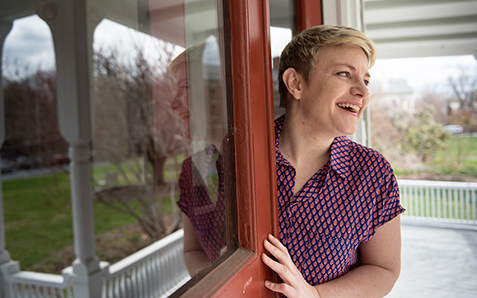

/ Published May 29, 2015
Looking outside of the confines of academia to pop culture can sometimes be a surprising source of insight for scholarly endeavors.
There are many good (and quite readable) books in political science, but I sheepishly admit that my research on women’s political inclusion across the Middle East and North Africa was inspired by much more prosaic, mainstream fare: an article in a glossy issue of O, The Oprah Magazine.

Back in graduate school, my friend and now colleague Aubrey Westfall gave me a subscription to O for my birthday—a sort of “chin-up, we’ll-get-through-grad-school-in-one-piece” type of gift. Month after month, I looked forward to my semi-regular dose of motivational articles sandwiched in between copious advertising.
One particular month there was a piece on the organization Women for Women International. This nongovernmental organization had a unique approach to gender empowerment for the time: its work solely focused on the rehabilitation of women who had been victims of sexual assault in six war-torn countries (I believe the countries were Iraq, Rwanda, Kosovo, Sudan, the Congo and Afghanistan). These women were often shunned in their respective communities because their assaults made them particularly vulnerable post-conflict. The argument went that Women for Women’s exclusive concentration on helping women with specific circumstances offered a source of targeted and ultimately sustainable support, more so than aid from rival agencies with a more diffuse focus.
The magazine’s account of Women for Women’s efforts to help battered Iraqi women by imparting relevant job skills motivated me to consider whether job training and education made a difference more broadly across the Middle East and North Africa. During my time as a Peace Corps volunteer in Jordan, I was surprised to witness so many women pursuing STEM fields at Yarmouk University, which, at the time, was billed as the MIT of the kingdom. I was ultimately curious whether and how these state and NGO-sponsored efforts to promote women’s education translated into substantive political inclusion.
My research reveals that foreign money has more of a say in political inclusion than local education trends, but, yes, my scholarship was indeed galvanized by what many would call a puff piece in the mainstream women’s press. To me, this experience underscores the need for academics to pay attention to the written word beyond the academe, as it can often yield fruitful insights and catalyze equally important research.
You never know where inspiration strikes, and I would like to extend my sincere thanks to O for representing my inadvertent muse in this case.
Bozena Welborne is an assistant professor of government.















